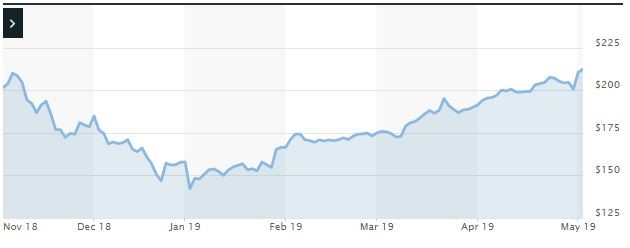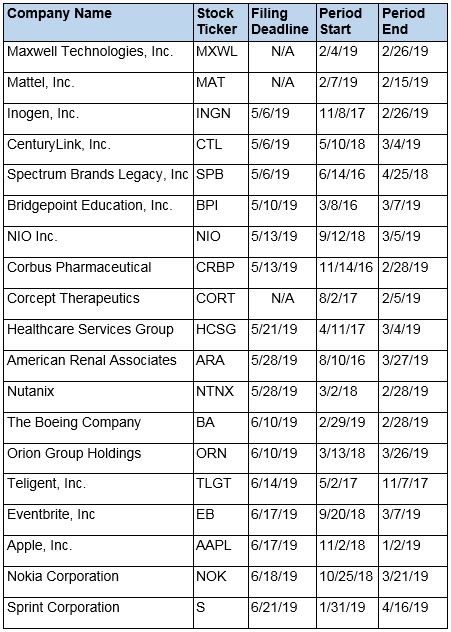Levi & Korsinsky Announce AAPL Lawsuit; AAPL Class Action
Levi & Korsinsky, LLP
May 7, 2019
City of Roseville Employees’ Retirement System v. Apple Inc. et al 4:19-cv-02033-YGR — On April 16, 2019, investors sued Apple, Inc. (“Apple” or the “Company”) in United States District Court, Northern District of California. Plaintiffs in the AAPL class action allege that they acquired Apple stock at artificially inflated prices between November 2, 2018 and January 2, 2019 (the “Class Period”). They are now seeking compensation for financial losses incurred upon public revelation of the Company’s alleged misconduct during that time. For more information on the AAPL lawsuit, please contact us today!
Summary of the Allegations
Company Background
The Company (NASDAQ: AAPL) engages in the design, manufacturing, marketing and sales of “mobile communication and media devices, and personal computers.”
Bolstered by global marketing and sales, Apple’s smartphones are among its best-known products. However, the Company also designs makes and sells tablets, laptops and desktop computers. In addition to these devices, it sells ancillary products and services to customers in the United States and abroad.
According to the April 16 complaint, Apple had 4.75 billion shares issued and outstanding as of October 26,2018.
Summary of Facts
Apple, and two of its senior officers and/or directors (the “Individual Defendants”) are now accused of deceiving investors by lying and/or withholding critical information about the Company’s business practices and prospects during the Class Period.
Specifically, they are accused of omitting truthful information about the demand for some of its products and related issues from SEC filings and related material. By knowingly or recklessly doing so, they allegedly caused Apple stock prices to trade at artificially inflated prices during the time in question.
The truth came out after trading ended on January 2, 2019. At that time, Apple released a letter from its CEO, Tim Cook to investors. In it, Apple revealed that its first quarter revenues for 2019 fell well short of predictions made just a few weeks before. The Company acknowledged that it had experienced “fewer iPhone upgrades than [it] had anticipated,” and blamed the poor performance on the Chinese economy.
It said in pertinent part: “While we anticipated some challenges in key emerging markets, we did not foresee the magnitude of the economic deceleration, particularly in Greater China. In fact, most of our revenue shortfall to our guidance, and over 100 percent of our year-over-year worldwide revenue decline, occurred in Greater China across iPhone, Mac and iPad.”
A closer look…
As alleged in the April 16 complaint, the Company and/or Individual Defendants repeatedly made false and misleading public statements throughout the Class Period.
For instance, in a press release issued at the beginning of the Class Period, the Company stated in pertinent part: “[o]ver the past two months, [Apple had] delivered huge advancements for [its] customers through new versions of iPhone, Apple Watch, iPad and Mac and well as [its] four operating systems and [that it was] enter[ing] the holiday season with [its] strongest lineup of products and services ever.”
In an ensuing conference call with investors and securities analysts, one of the Individual Defendants reiterated the claim, and added that it justified “a new all-time record” of “expected revenue [of] between $89 billion and $93 billion.”
In response to questions about “macroeconomic uncertainty” in “emerging markets” during the same conference call, the other Individual Defendant stated in relevant part: “And so I think – or at least the way I see these is each one of the emerging markets has a bit of a different story. In relation to China specifically, I would not put China in that category. Our business was very strong last quarter.”
Impact of the Alleged Fraud on Apple’s Stock Price and Market Capitalization
| Closing stock price prior to disclosures:
|
$157.92 |
| Closing stock price the trading day after disclosures:
|
$142.19 |
| One day stock price decrease (percentage) as a result of disclosures:
|
9.96% |
The following chart illustrates the stock price during the class period:
Actions You May Take
If you have purchased shares during the Class Period, you may join the class action as a lead plaintiff, remain a passive class member, or opt out of this litigation and pursue individual claims that may not be available to the class as a whole.
NOTE: The deadline to file for lead plaintiff in this class action is June 17, 2019. You must file an application to be appointed lead plaintiff prior to this deadline in order to be considered by the Court. Typically, the plaintiff or plaintiffs with the largest losses are appointed lead plaintiff.
In order to identify your potential exposure to the alleged fraud during the time in question, you may wish to perform an analysis of your transactions in Apple common stock using court approved loss calculation methods.
Recently Filed Cases
Listed below are recently filed securities class action cases being monitored by us, along with the class period and the deadline to file a motion to be appointed as the Lead Plaintiff in the action. Please contact us if you would like an LK report for any of these cases:
About Us
Levi & Korsinsky is a leading securities litigation firm with a hard-earned reputation for protecting investors’ rights and recovering losses arising from fraud, mismanagement and corporate abuse. With thirty attorneys and offices in New York, Connecticut, California and Washington D.C., the firm is able to litigate cases in various jurisdictions in the U.S., England, and in other international jurisdictions.
Levi & Korsinsky provides portfolio monitoring services for high-net worth investors and institutional clients. Our firm also assists investors in evaluating whether to opt-out of large securities class actions to pursue individual claims.
For additional information about this case or our institutional services, please contact us.

